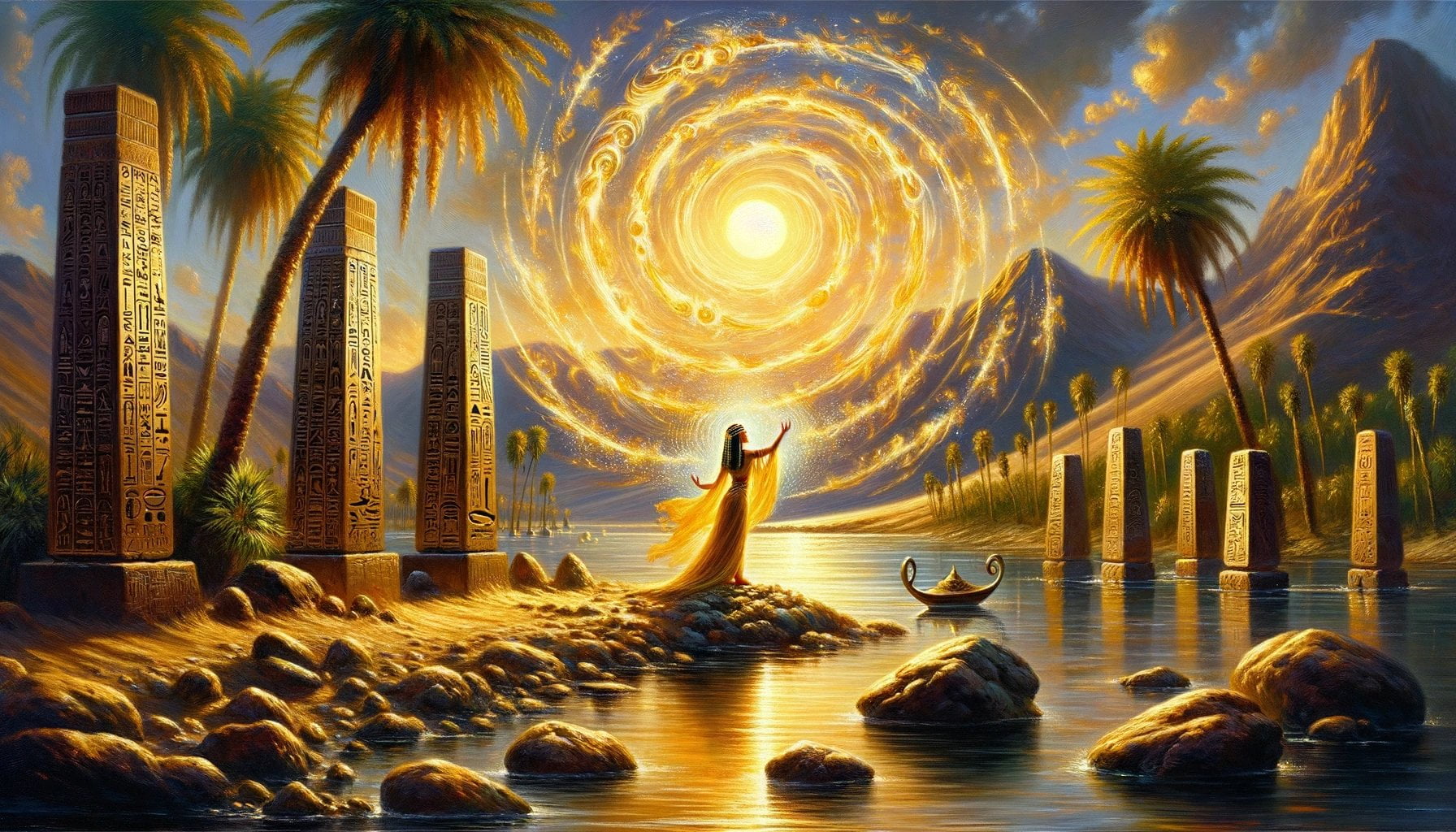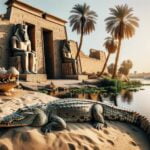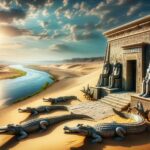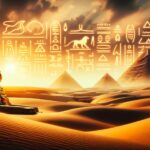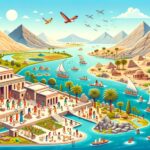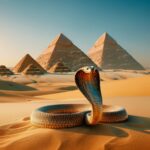Welcome to a journey through time and ancient wonders as we delve into the captivating realm of magic in ancient Egypt. In this article, titled “Unveiling Egypt’s Ancient Magic: Exploring the Enigmatic World of Spells and Beliefs,” we will embark on a quest to unravel the secrets and mysteries surrounding the magical practices of one of history’s most intriguing civilizations. Brace yourself for a captivating exploration of spells, rituals, and beliefs that will transport you back to the fascinating world of ancient Egypt.
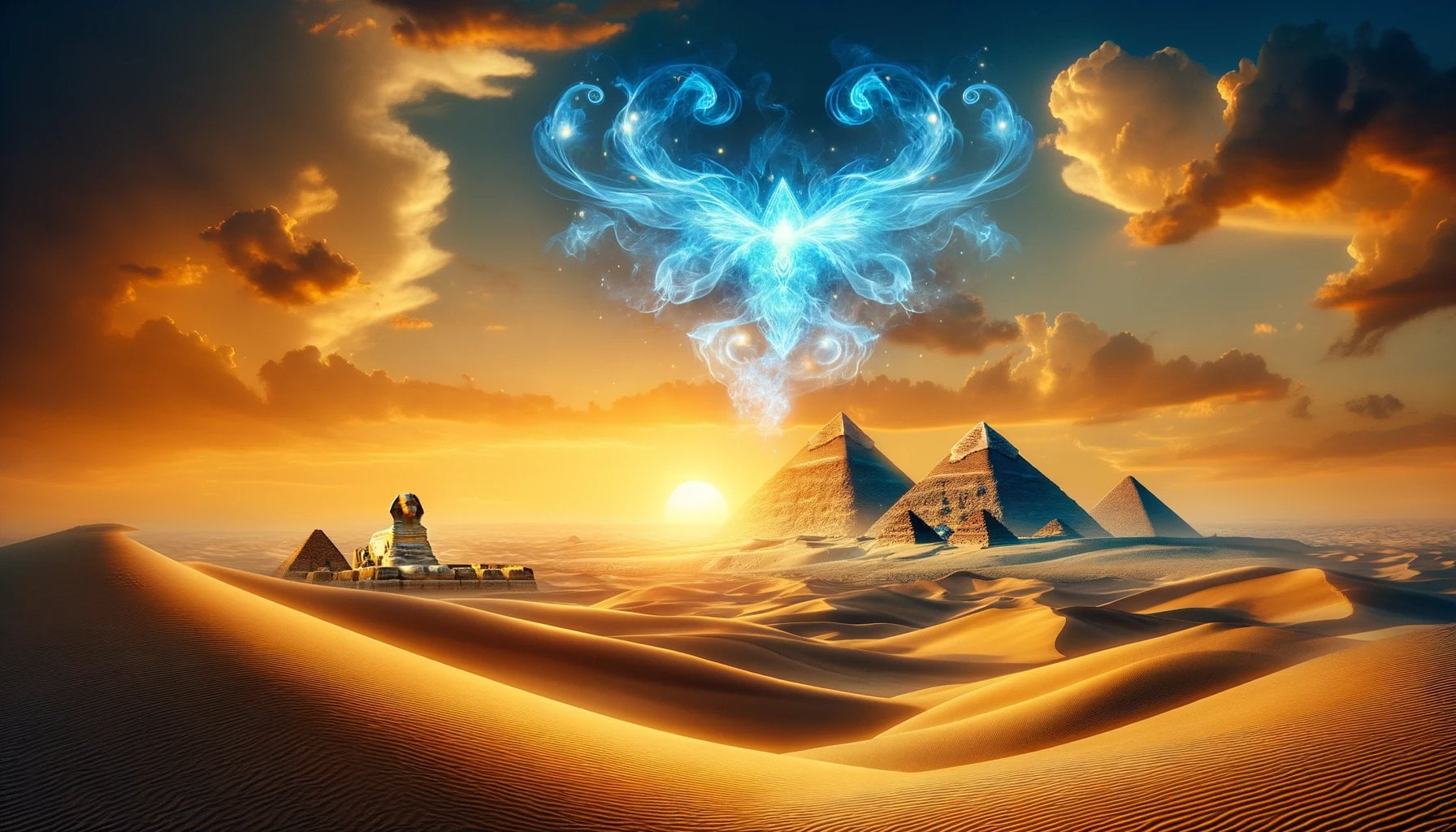
Key Takeaways:
- Heka, the god of magic and medicine, had a significant role in ancient Egypt.
- Magic was regarded with the same importance as medicine by medical professionals.
- Magician-priests and priest-physicians would invoke Heka in their practices.
- Magic was intertwined in various aspects of ancient Egyptian life, including daily life, religion, medicine, and death.
- Seers and wise women played a crucial role in healing and had the ability to see the future.
- Mummification was practiced to preserve the body for the afterlife.
- Ancient Egyptians strongly believed in the power of magic to influence their destiny and connect humans, gods, and the deceased.
- The practice of magic involved the use of words, gestures, and physical objects.
- Scholars throughout history have extensively researched and explored magic in ancient Egypt.
Sources:
Magic in Ancient Egypt
Have you ever wondered about the mystical and enchanting world of magic in ancient Egypt? Step back in time with me as we explore the enigmatic practices of spells and beliefs in this fascinating civilization. In ancient Egypt, magic held great significance and played a crucial role in various aspects of daily life, religion, medicine, and even death. Let’s delve into the depths of this captivating subject and uncover its secrets.
The Power of Heka: God of Magic and Medicine
To truly understand the magic of ancient Egypt, we must first acquaint ourselves with Heka, the god of magic and medicine. In this ancient civilization, magic was held in high regard and considered just as important as medicine. Magician-priests and priest-physicians would invoke Heka in their practices, harnessing his power to bring healing and wellbeing to the people.
Magic in Daily Life and Religion
Magic was an integral part of everyday life in ancient Egypt. Seers and wise women played a crucial role in society, utilizing their supernatural abilities to heal and even see into the future. The ancient Egyptians strongly believed in the power of magic to influence their destiny and bridge the gap between humans, gods, and the dead.
Bridging the Gap: Magic and Death
Death held great significance in ancient Egypt, and the practice of magic played a pivotal role in the journey to the afterlife. Mummification was performed to preserve the body, ensuring its successful transition into the realm of the dead. The belief in the power of magic and rituals was paramount, as they facilitated the safe passage of the deceased through the perilous underworld.
Unveiling the Practice of Magic
Now that we have a deeper understanding of the spiritual and cultural significance of magic in ancient Egypt, let’s explore the intricacies of its practice. Ancient Egyptian magic involved a blend of words, gestures, and physical objects. Spells and rituals were meticulously performed to achieve specific outcomes, such as healing, protection, or success.
Scholarly Research and Exploration
Scholars throughout history have dedicated themselves to unraveling the mysteries of ancient Egyptian magic. Their comprehensive research and analysis have shed light on the intricate rituals, spells, and beliefs that formed the backbone of this mystical world. By studying ancient texts and artifacts, these historians have pieced together a captivating narrative of the magical practices of this ancient civilization.
With its rich historical significance and deep-rooted cultural beliefs, magic in ancient Egypt continues to mesmerize and enchant us to this day. By exploring the practices, rituals, and beliefs surrounding this extraordinary phenomenon, we gain invaluable insight into the daily lives and spiritual realm of the ancient Egyptians.
Sources:
– World History Encyclopedia:
– “Magic in Ancient Egypt” – source
– TheCollector:
– “Magic in the Ancient World: Egyptian Deities and Uses” – source
Have you ever wondered about the supreme god of ancient Egypt? Click here to learn more about the fascinating deity who ruled over the Egyptian pantheon.
Curious about the ten laws that governed ancient Egypt? Discover the intriguing 10 laws of ancient Egypt that shaped their society and culture.
In ancient Egypt, certain birds were revered and venerated. Dive into the world of ancient Egyptian beliefs and explore the significance of the bird venerated in ancient Egypt.
Among the numerous Egyptian gods, the crocodile god held a unique place in ancient Egypt. Uncover the mythology and worship surrounding the crocodile god ancient Egypt.
Did you know that the ancient Egyptians used toothpaste? Uncover the secrets of oral hygiene in ancient times with the intriguing history of toothpaste ancient Egypt.
While ancient Egypt was a civilization of great wonders, it also had its downsides. Discover some of the not-so-glorious aspects in our exploration of bad things about ancient Egypt.
The black cat was a symbol of mysticism and spirituality in ancient Egypt. Delve into the mysterious world of the black cat ancient Egypt to uncover its significance.
Explore the stories behind the powerful ancient queens who ruled alongside pharaohs with our captivating article on the ancient queens of Egypt.
Ancient Egypt holds many mysteries waiting to be unraveled. Embark on a journey of discovery as we delve into the intriguing mysteries of ancient Egypt.
Snakes played a significant role in ancient Egyptian mythology. Unveil the mysteries of these serpentine creatures as we explore the snakes of ancient Egypt.
Rituals and Spells: Unraveling the Mysteries of Ancient Egyptian Magic
Ancient Egypt, a civilization known for its rich cultural heritage and enduring mystique, held a deep fascination with the supernatural and the enigmatic world of magic. Rituals and spells formed an integral part of the ancient Egyptian society, permeating every aspect of life, from religion and medicine to death rituals. By delving into the captivating realm of ancient Egyptian magic, we can gain a profound understanding of their beliefs and practices, uncovering the captivating mysteries that lay within.
Unlocking the Pervasiveness of Magic in Ancient Egypt
Magic held immense significance in the daily lives of ancient Egyptians, influencing their worldview, religious practices, and social norms. It was an integral part of their society, with seers and wise women using their supernatural abilities to heal the sick and predict the future. Magic and medicine were held in equally high regard, with a class of practitioners known as swnw who specialized in both fields.
Magic’s relevance in ancient Egypt extended beyond the realm of the living. In death rituals, such as mummification, magical spells and rituals were performed to ensure a safe passage to the afterlife. Even the gods themselves were not exempt from the influence of magic. Heka, the god of magic and medicine, was invoked by magician-priests in their practice of magic.
Piecing Together the Glimpses of Ancient Egyptian Magic
Our understanding of ancient Egyptian magic relies on a variety of sources, including ancient texts, artifacts, and archaeological discoveries. Museums such as the British Museum and the Louvre house remarkable collections of magical objects that provide glimpses into the practice of magic in ancient Egypt.
One particularly intriguing source is the Egyptian Handbook of Ritual Power, which contains a compendium of spells, invocations, and magical remedies. Within its pages, one can find everything from love spells to cures for illnesses, allowing us to connect with the ancient Egyptians’ hopes, fears, and aspirations.
Ancient Egyptian Magic: An Enduring Legacy
The practice of ancient Egyptian magic extends beyond the borders of Egypt itself. As the centuries passed, Egyptian magical traditions seeped into other cultures, such as the Greek and Roman civilizations. Fascinatingly, traces of Egyptian magic can still be found in these cultures, attesting to its enduring influence.
While the origins of ancient Egyptian magic continue to be a subject of study and debate, one thing remains clear: its practice pervaded every facet of ancient Egyptian life. From the humblest citizen to the most esteemed priest, magic held a firm grip on the collective consciousness of the civilization, shaping their beliefs, rituals, and understanding of the world.
Key Takeaways:
- Magic in ancient Egypt played a crucial role in daily life, religion, medicine, and death rituals.
- Heka, the god of magic and medicine, was invoked by magician-priests in their practice of magic.
- Seers and wise women used their supernatural abilities for healing and fortune-telling.
- Death rituals involved magical practices, such as mummification.
- Egyptian magical objects can be found in prominent museums like the British Museum and the Louvre.
- The Egyptian Handbook of Ritual Power contains diverse spells and invocations.
- Ancient Egyptian magic had a lasting impact on Greek and Roman cultures.
- The origins of ancient Egyptian magic are a subject of ongoing study.
Sources:
– World History Encyclopedia – Magic in Ancient Egypt
– Ancient Egyptian Handbook of Spells Deciphered
Magic in Religion: The Intersection of Divine Worship and Supernatural Practices
Magic in ancient civilizations has long fascinated historians, offering a glimpse into the enigmatic world of spells, rituals, and beliefs. Ancient Egypt, in particular, holds a treasure trove of knowledge about the intersection of magic and religion. In this article, we will delve into the captivating realm of Egyptian magic, exploring its significance in daily life, religion, and societal norms.
The difficulty in studying the role of magic in ancient times arises from the blurred line between magic and religious ritual. In ancient Egypt, magic was practiced by magician-priests or priest-physicians who invoked the god Heka, the god of magic and the practice of the art itself. However, the distinction between magic and religion in ancient Egypt is unclear, as magic often intersected with religious beliefs and practices.
Magic played a vital role in various aspects of ancient Egyptian society. It was not confined to arcane rituals; instead, it was deeply integrated into daily life, religion, medicine, and death. Seers and wise women used their supernatural abilities to heal the sick and predict the future, showcasing the close association between magic and medicine.
Death rituals also incorporated magical practices, with mummification and specific rituals ensuring a safe passage to the afterlife. Ancient Egyptians believed that magical spells and rituals performed during burial ceremonies would protect the deceased and facilitate their journey to the next realm.
Ancient Egyptian magic involved a combination of words, gestures, and physical objects to achieve specific outcomes. Egyptian deities, particularly protective deities, were believed to possess magical powers, and objects such as amulets were charged with magic to provide protection and blessings.
The integration of magic and religion in ancient Egypt was evident in the rituals, symbols, and the use of supernatural powers to achieve desired outcomes. This intertwining of magic and religion enabled the ancient Egyptians to navigate the challenges of daily life, seek protection from malevolent forces, and maintain a harmonious relationship with the divine.
Ancient Greek magic, too, was intertwined with religious practices and rituals. Practitioners used magic to communicate with or influence the gods, employing spells, incantations, and divination.
Studying ancient Egyptian magic is challenging, as it is often difficult to determine whether it was religious or mundane in nature. Nevertheless, historians and archaeologists have conducted extensive research, utilizing ancient texts and artifacts to shed light on the practices and beliefs surrounding Egyptian magic. Ancient texts such as the “Egyptian Handbook of Ritual Power” contain spells and remedies that offer a glimpse into the hopes and fears of the ancient Egyptians.
In conclusion, ancient Egyptian magic was a vital and intricate component of their society, influencing their worldview, religion, medicine, and social norms. The integration of magic and religion allowed the ancient Egyptians to navigate their daily lives and seek divine guidance. By studying Egyptian magic, we gain insight into the beliefs, rituals, and practices of one of the world’s oldest civilizations.
Key Takeaways:
- Magic in ancient Egypt was deeply intertwined with religion, playing a significant role in daily life, medicine, death rituals, and divine worship.
- The distinction between magic and religion in ancient Egypt is unclear, as the practices often intersected.
- Egyptian magic involved a combination of words, gestures, and physical objects to achieve specific outcomes.
- Ancient texts and artifacts provide valuable insights into the practices and beliefs surrounding Egyptian magic.
- Studying Egyptian magic offers a glimpse into the lives, worldview, and societal norms of the ancient Egyptians.
Sources:
– Goodwin, Alexandra. “‘Magic’ in ancient Greek and Egyptian religious rituals and practices.” academia.edu.
– Mark, Joshua J. “Magic in Ancient Egypt.” World History Encyclopedia.
Legacy and Significance of Ancient Egyptian Magic in Modern Understanding and Popular Culture
Magic in ancient Egypt held immense significance and played a crucial role in various aspects of society, from daily life to religion, medicine, and death rituals[^1^]. The legacy of this ancient Egyptian magic continues to influence modern understanding and popular culture, leaving an enduring impact on magical, religious, artistic, and political fields[^5^].
Ancient Egyptians believed that magic had the power to tap into supernatural forces and achieve specific goals[^1^]. Heka, the god of magic and medicine, was invoked by magician-priests or priest-physicians during the practice of magic[^1^][^2^]. It was intertwined with their religious beliefs, offering people the ability to navigate challenges, seek protection, and maintain a relationship with the divine[^5^]. As such, magic in ancient Egypt was not only a form of power but also an integral part of their worldview and social norms.
In daily life, magic played a vital role. Individuals known as seers and wise women possessed the ability to see the future and were highly regarded for their mystical abilities[^3^]. These individuals used magic to heal, making it an essential aspect of ancient Egyptian medicine[^2^][^3^]. Their supernatural abilities and connections to magical forces were highly valued in society.
Magic also played a significant role in death rituals. Mummification, a practiced technique used to preserve the body, involved magical rituals to ensure a successful transition to the afterlife[^4^]. From birth to death, the belief in the power of magic was present, highlighting its enduring significance throughout all stages of life[^4^].
The legacy of ancient Egyptian magic can be seen in various aspects of modern understanding and popular culture. Ancient Egypt’s magical practices and beliefs have influenced magical traditions, rituals, and beliefs in different cultures and societies around the world[^5^]. Its impact can be witnessed in the magic portrayed in books, movies, and TV shows, with ancient Egyptian symbols and iconography often used to depict magical themes[^5^]. The enduring fascination with ancient Egyptian magic provides valuable insights into the lives and beliefs of one of the world’s oldest civilizations.
Key Takeaways:
- Magic in ancient Egypt played a significant role in daily life, religion, medicine, and death rituals.
- Heka, the god of magic and medicine, was revered and invoked by magician-priests.
- Magic was intertwined with religion and allowed people to navigate challenges, seek protection, and maintain a relationship with the divine.
- Seers and wise women possessed mystical abilities and used magic for healing, making it integral to ancient Egyptian medicine.
- Magical rituals were performed during death rituals, ensuring a successful transition to the afterlife.
- The legacy of ancient Egyptian magic can be found in modern understanding and popular culture, influencing magical traditions, rituals, and beliefs worldwide.
Sources:
[^1^]: World History Encyclopedia. (n.d.). Magic in Ancient Egypt.
[^2^]: World History Encyclopedia. (n.d.). Magic & Medicine.
[^3^]: World History Encyclopedia. (n.d.). Magic in Daily Life.
[^4^]: World History Encyclopedia. (n.d.). Magic in Death.
[^5^]: World History Encyclopedia. (n.d.). Magic & Religion.
Retrieved from https://www.worldhistory.org/article/1019/magic-in-ancient-egypt/
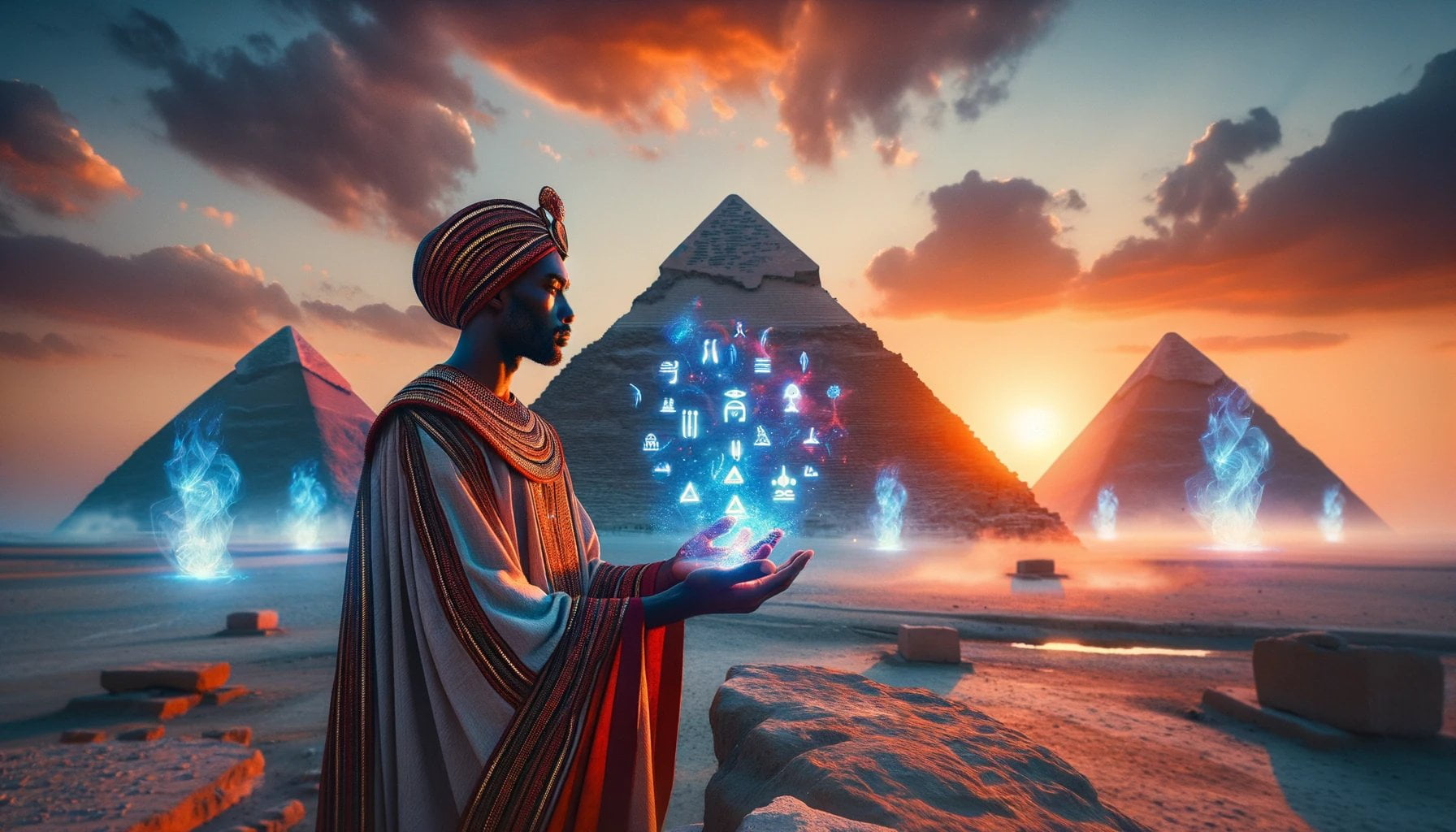
FAQ
Q1: What was the role of magic in ancient Egyptian society?
A1: Magic played a significant role in ancient Egyptian society, intertwining with religion, medicine, daily life, and death. It was believed to harness supernatural forces and achieve specific goals.
Q2: Who was Heka and how was he connected to magic in ancient Egypt?
A2: Heka was the god of magic and medicine in ancient Egypt. Magician-priests and priest-physicians would invoke Heka in their practices of magic. He was also associated with healing and was considered the god of medicine.
Q3: How was magic used in daily life in ancient Egypt?
A3: In ancient Egypt, magic was utilized by individuals such as seers and wise women. These individuals possessed the ability to see the future and played a crucial role in healing. Magic was believed to have the power to influence daily life events.
Q4: What role did magic play in death rituals in ancient Egypt?
A4: Magic played a role in death rituals in ancient Egypt, particularly in the practice of mummification. Mummification techniques were used to preserve the body and ensure a successful transition to the afterlife. Magic was believed to assist in this process.
Q5: How has ancient Egyptian magic influenced modern culture?
A5: The legacy of ancient Egyptian magic can still be seen in modern culture. Its influence can be found in magical, religious, artistic, and even political fields. Ancient Egypt has left enduring legacies in these areas, reflecting the impact and significance of their magic and beliefs.
- Crypto Quotes’ Red Flags: Avoid Costly Mistakes - June 30, 2025
- Unlock Inspirational Crypto Quotes: Future Predictions - June 30, 2025
- Famous Bitcoin Quotes: A Deep Dive into Crypto’s History - June 30, 2025
